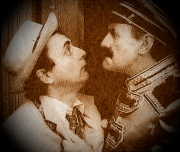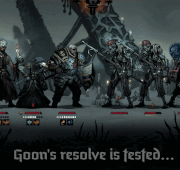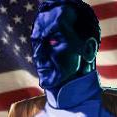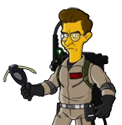|
CobiWann posted:If I recall, the dream crabs are attracted to people "thinking' about them. If you're thinking about a dream crab, it's coming for you. I believe the four people in the base all had seen something while they were awake that tied them together - Rhonda wasn't thinking of "dream crabs" but of the facehugger from Alien, and someone else was thinking of The Thing From Another World which had an Arctic base under siege. The dream crabs took those memories, put together a narrative, and attacked with them. So the dream crabs can travel through space and (possibly) time? They didn't look like planet conquerors. And I think you're correct about what Moffat intended to be the cause of the crab menace, but if that's what it is then what it is is really stupid. If The Doctor was on another planet how did he communicate in real time with everyone millions or billions or trillions of miles away? I guess they have some sort of FTL bug part that lets them do it. This sounds like a nitty gritty science point in a program that's pretty flagrantly science fantasy but really it's sloppy rear end writing. Jerusalem posted:It certainly doesn't account for the remarkable coincidence of these people being attacked on Earth in the early 21st Century while the Doctor is similarly attacked at some undefined point in time and space. I guess maybe you could say he was initially attacked and kicked off the whole thing by making the Crabs aware of Earth and Clara specifically, and the others were just kinda caught up in the net by pure bad luck. The crabs are not mustache twirling villains though, why should they be interested in Clara? You're talking about rending the heavens and time itself, it's not something a psychic bug should be capable of. I could buy that some other race is controlling them, and maybe they're seeding them throughout time and space but The Doctor never mentioned anything about that so I doubt it. Dr. Gene Dango MD fucked around with this message at 00:37 on Jun 18, 2015 |
|
|
|

|
| # ? Apr 26, 2024 06:34 |
|
Noxville posted:Jobs spent the first year after diagnosis doing acupuncture and spiritualism rather than treating his cancer though. Seems Hurt's doing the opposite, being both aggressive with his treatment and saying "drat the torpedoes" and going full steam ahead with what he wants to do - continue his career.
|
|
|
|
Dr. Gene Dango MD posted:If The Doctor was on another planet how did he communicate in real time with everyone millions or billions or trillions of miles away? A wizard did it.
|
|
|
|
The_Doctor posted:
A found-footage horror movie called Grave Encounters. Crew of one of those fake "ghost hunting" shows get trapped in a haunted asylum. For the genre, it's pretty solid. They used an actual closed hospital in Vancouver and played around a bit with the standard horror tropes/cliches, enough to give a veteran horror watcher like me a few uneasy moments. Worth a look if you're a horror/suspense fan.
|
|
|
|
End of Time was on TV earlier tonight, and it finally dawned on me that the reason that part 2 is better than part 1 is because Rusty had an extra day to write it.
|
|
|
|
So here’s a weird question because I’m trying to do a timeline in my head… I know the term “showrunner” wasn’t in vogue at the time, but starting with Robot all the way through to Survival, who were the “showrunners” for Doctor Who?. I ask because I see “producer” and “script editor” and I get slightly crosseyed.
|
|
|
|
The Producer would be in overall charge of the show, and would oversee pretty much everything apart from the scripts (although most of the producers took a huge interest in the scripts nonetheless). The Script Editor is in charge of finding and commissioning scripts, working on them to fit the budget/filming constraints and so on. It's no coincidence that the highly regarded eras of the programme feature heavy collaboration between the Producer and the Script Editor on most aspects of the show, though. From memory: Robot: Barry Letts (Producer) and Robert Holmes (Script Editor) The Ark in Space to The Talons of Weng Chiang: Philip Hinchcliffe (Producer) and Robert Holmes (Script Editor) Horror of Fang Rock to Image of the Fendahl: Graham Williams (Producer) and Robert Holmes (Script Editor) The Sun Makers: Graham Williams (Producer) and Robert Holmes/Anthony Read (Script Editors) Underworld to The Armageddon Factor: Graham Williams (Producer) and Anthony Read (Script Editor) The Armageddon Factor: Graham Williams (Producer) and Anthony Read/Douglas Adams (Script Editor) Destiny of the Daleks to Shada: Graham Williams (Producer) and Douglas Adams (Script Editor) The Leisure Hive to Logopolis: John Nathan-Turner (Producer) and Christopher (Hamilton) Bidmead (Script Editor) Castrovalva: JNT (Producer) and Eric Saward (Script Editor) Four to Doomsday: JNT (Producer) and Antony Root (Script Editor) Kinda: JNT (Producer) and Eric Saward (Script Editor) The Visitation: JNT (Producer) and Antony Root (Script Editor) Black Orchid: JNT (Producer) and Eric Saward (Script Editor) Earthshock: JNT (Producer) and Antony Root (Script Editor) Time-Flight: JNT (Producer) and Eric Saward (Script Editor) Arc of Infinity to Mindwarp: JNT (Producer) and Eric Saward (Script Editor) Terror of the Vervoids: JNT (Producer) and JNT (Script Editor) The Ultimate Foe: JNT (Producer) and Eric Saward/JNT (Script Editors) Time and the Rani to Survival: JNT (Producer) and Andrew Cartmel (Script Editor)
|
|
|
|
CobiWann posted:So here’s a weird question because I’m trying to do a timeline in my head… The Script Editor and Producer were supposed to work as a team: the former acting as "head writer", contributing (originally) one story per season themselves and turning scripts into workable material. For Robert Holmes, this meant complete re-writes frequently enough that they basically lifted the "one per season" rule for him. The Producer was in charge of making the actual episodes, so everything (and everyone) you saw on-screen. Theoretically, they'd keep in each other in check, with the producer soliciting stories for the Script Editor so they didn't have too much control... and couldn't write blank checks by soliciting themselves for stories. In the JNT years, you can pretty much break down the era by script editor. They were essentially running the show at the times he was loving around at conventions in the US, after all. It breaks down like this for the era you're talking about :
TLDR - The Baker years can be broken down stylistically by Producer, after that by Script Editor. If it keeps your head from exploding, go by season breaks rather than staff changes. EDIT - I'll get you next time, pinacotheca! Neext tiiiime!
|
|
|
|
EDIT: noooooo CobiWann posted:So here’s a weird question because I’m trying to do a timeline in my head… No one, really. The responsibilities of a modern DW showrunner were more or less split between the producer and the script editor, and you can't really speak of the influence one had on a certain era without considering that of the other. While the producer made the big decisions and had final say on most things, the script editor dealt with the nitty-gritty of what was to be filmed and it is often his influence that's more immediately recognisable in the final product. That's my understanding of it, at least. Anyway, Doctor Who's producer & script editor tag-teams from the mid-70s to the late 80s were:
|
|
|
|
Is the topically on-sale Curse of Davros any good? I am a huge Davros fan and think he's easily the best antagonist the show's ever had, but the idea of him having a dastardly scheme to make Napoleon win the Battle of Waterloo sounds, well, really very poo poo indeed.
|
|
|
|
I unironically love that three people created effortposts, with lists and in-depth explanations so quickly that they basically all posted answers at the same time. That's really just amazing.
|
|
|
|
vegetables posted:Is the topically on-sale Curse of Davros any good? I am a huge Davros fan and think he's easily the best antagonist the show's ever had, but the idea of him having a dastardly scheme to make Napoleon win the Battle of Waterloo sounds, well, really very poo poo indeed. For the price? Worth it. One, it’s a Colin Baker story. Two, Flip’s a decent companion. Three, imagine if Douglas Adams took a turn at writing a Dalek story, mitigate your expectations a bit, and there you go. Bicyclops posted:I unironically love that three people created effortposts, with lists and in-depth explanations so quickly that they basically all posted answers at the same time. That's really just amazing. So do I! Thanks you three for taking the time and effort to make those posts. It definitely helps with my upcoming project…
|
|
|
|
The Curse of Davros isn't a classic but it's a good deal of fun. It's a good romp, and for a good portion of the story the Doctor and Davros swap brains. (Not really a spoiler, it's one of the biggest parts of the story.)
|
|
|
|
Rochallor posted:The Curse of Davros isn't a classic but it's a good deal of fun. It's a good romp, and for a good portion of the story the Doctor and Davros swap brains. (Not really a spoiler, it's one of the biggest parts of the story.) Spoiler is also exceedingly obvious in the first episode, which makes the build to the 'reveal' really anti-climactic.
|
|
|
|
 Immortal Beloved feels to me like an original series Star Trek episode, which isn't necessarily a bad thing but doesn't fit in particularly well as a Doctor Who story. The Doctor and Lucie land on a planet ruled by people claiming to be the ancient Greek Gods, where it turns out they're using ancient technology to grant them their "powers", and As with many Doctor Who stories, this episode suffers from having an ENTIRE planet ruled by one tiny group of people in a very specific location, the logistics of which would be pretty insane. That said, this is blunted somewhat by setting the story almost entirely within the confines of the ruling elite's home, and going into very little detail about the extent of colonization of the planet itself. It's entirely possible that this planet was not inhabited by any sentient beings, and that even with the passengers on the original ship breeding out over a 1000 years the population of the planet might still be relatively small and enclosed in a specific area. This would be basically a necessity, with a large enough population spread out over a large enough area, control by such a small elite would be impossible - especially since the "stock" used by the "Gods" is apparently raised outside their insulated palace but demonstrate intelligence and education, indicating that the "Gods" haven't restricted education too heavily amongst the greater population. These are all niggling issues that might make for a very interesting but very different kind of story, and since it clearly wasn't the audio's intent to explore these issues, it's probably for the best that they don't even pay lip service to the outside population and just concentrate everything on the small handful of characters we do see. The Doctor and Lucie accidentally interrupt a couple on a clifftop when the TARDIS lands near them, and we get to see the Doctor and Lucie both prove their observation skills in different ways. Both pick up on the visual cues and come to entirely different but accurate conclusions, demonstrating that they think and see the world differently, a necessity for a good Doctor/Companion dynamic, fill in the gaps for each other. Lucie sees a man and a woman alone together in a remote location and correctly identifies that they're lovers looking for privacy, and apologizes for intruding. The Doctor, however, notes both the fineness of their clothes as well as the obvious lack of care for their current condition, and together with the remoteness of the location correctly guesses that they've come up here with no intention of ever going back, they're here to commit suicide. A soldier arrives on the scene and confirms this, it seems the two are trying to escape the destiny the Gods have in store for them, and they're soon joined by the leader of the soldiers, General Ares, the God of War. The suicidal young man - Kalkin - grabs a gun and shoots Ares, so they have to quickly rush him back to the palace to be healed, kept alive in transit only by the Doctor, which is a good thing since he was about to be thrown in a prison before that. On the trip, Lucie gets to know the soldier - Tayden - and is horrified when she observes exactly how the healing process for Ares will take place - his mind is shifted from his dying body's into Tayden's. Tayden, it turns out, is a clone of Ares raised from birth for the express purpose of being a back-up body for Ares if he got hurt or grew too old and infirm and needed to continue. Though the story sadly doesn't spend much time reflecting on it, the way this process came into being an accepted part of this culture (Tayden is fully aware of his fate) is fascinating. A spaceship crashed on the planet 1000 years ago, and most of the passengers were woefully unprepared for the hardship of making it in the untamed wilderness. The crew were competent enough to run things and keep everybody alive, but were faced with a conundrum - if any of them died, the new society they had no choice to build would collapse without their leadership. So they used an experimental (and banned in the 1000 years since) piece of technology that survived the crash, a machine that could transfer the consciousness of a person from one body to another. The problem was, the body needed to be a certain age to accept a fully realized alien consciousness into itself... but not too old to where the existing mind had solidified in place. So they batch grew clones, having the regular citizens raise them for 16 or so years, then bringing them to live in the palace with them for a handful of years. If their bodies weren't needed before they reached an age where they could no longer be "used", then they were given an actual retirement - a home, a pension, and a long life free from worry as reward for having been prepared to make the sacrifice. But if they were needed, then their own minds would be wiped out by those of the society's leaders, a sacrifice they were willing to make for the good of the society. But over 1000 years things changed, the original crew became used to the good life, used to being thought of as indispensable, used to being treated like Gods... and so they declared themselves to be so. After all, it's so much easier to convince people to sacrifice the lives of others if it is to a God and not another human being. So the original intention was corrupted, and the population seemingly kept just stupid enough not to question the way things had always been for as long as they could remember. The ability to pull off this kind of corrupt character relies on the script of course, but also the performance. Luckily, Zeus is played by Ian McNiece (who played Churchill in season 5 & 6 of the revived series) and he does quite wonderfully at playing him as grossly corrupt, a hedonistic monster so used to 1000 years of having everything his own way that he's come to believe his own press. It would be easy to make him blinded by his own corruption, but you don't make it to 1000 without being smart and capable (the whole reason he was the leader of the new society in the first place) and he clearly sees all the angles even through the drunken haze of booze he consumes without concern for consequence. He can see where Kalkin is coming from, not wanting to give up either his identity or that of his lover (Sararti) but makes the point that he still feels the same way about his Hera even after 1000 years, intimating that Kalkin and Sararti's close bond is down to who they are cloned from. He can see that the machine they use to transfer their consciousness is breaking down (it's 1000 years old, after all!) but that the Doctor offers a unique opportunity for him to replace or repair it. And most importantly he can see that the Doctor will never agree to such a thing but that he can use Lucie to force him to acquiesce. Zeus is completely in charge of his faculties, and delights in mocking Lucie when he suggests that if the Doctor and Lucie escape then he will use a sample of Lucie's DNA to create clones of her to be tortured - when Lucie notes these will not be her in any way, he taunts her for being so quick to give up on the rights of the clones she was arguing so passionately for when it came to Kalkin and Sararti. So it's wonderfully ironic that in the end it is Zeus being blinded by love that leads to his downfall. When Hera collapses, dying of old age, he rushes Sararti to the machine to transfer Hera's consciousness but is too late, she dies before he can start. But Sararti pretends to have been converted, giving her the opening she needs to assault him and try to kill him. This in turn leads to another deception involving Kalkin and the Doctor, which causes the story to end on a peculiar note - as far as anybody else (including Ares) are concerned, the status quo remains unchanged. Zeus and Hera still rule the "world", and while the suggestion is that the two "Gods" will now change up the society, will they be able to do this without arousing Ares' suspicion? Also, the presence of the Ganymede character (played by McGann's son) and a brief remark about the transfer machine seemed to leave things open for either a sequel or a wrinkle in the "happy" ending. Essentially, the Doctor and Lucie have very little impact on the story, their presence aids in allowing Kalkin and Sararti to make their moves, but they do so mostly independent of anything the Doctor or Lucie do. The two main characters of the show are essentially observers, and while the story couldn't have happened without them, very little seems to happen because of anything they themselves do. Their presence alone seems to upset things just enough to allow change to happen, but they have little active part in that change. Immortal Beloved is an interesting concept, but suffers from exploring it in a shallow way, and leaves the main characters of the Doctor and Lucie as mostly passive observers. The openness of the ultimate fate of the clones is an interesting take on things, but highlights one of the issues with the society we're supposed to believe exists - the "Gods" seem entirely too open for their own good, everybody knows about the clones, the clones themselves are fully aware of their potential fates, and yet apparently for 1000 years nobody has ever tried to overthrow the Gods either as part of a societal revolution (a very brief comment is made about the existence of revolutionaries early in the story, then never mentioned again) or for purely selfish individual reasons. Also, the Gods only make one clone at a time? Kalkin and Ganymede are a few years apart in age, indicating that they try to stage out the clones so there is always one in the right age bracket in case they need them... but what if something happens to that one clone and they have to survive for 2-3 years without a safety net till the younger one is ready? Questions like these can't help but come up in a story that - by necessity of the shorter format - so shallowly touches on a subject with such great potential depth (just look at how much discussion was kicked up by the Flesh 2-parter in season 6). In the end, this audio just offers an interesting situation that should at least make the listener ponder how they would deal with a similar situation. It feels more like Star Trek than Doctor Who, and doesn't particularly tax either McGann or Smith in their portrayals of the Doctor and Lucie, but there's nothing particularly wrong with it.... I just wish there could have been more that was right.
|
|
|
|
I've been gradually working my way through the 8/Charley stories and finally got to Zagreus. Am I being a philistine for thinking it was kind of a bloated mess? The general concept behind it was neat but it really felt like they needed a platoon of editors to go through that script like a swarm of termites.
|
|
|
|
evenworse username posted:I've been gradually working my way through the 8/Charley stories and finally got to Zagreus. Am I being a philistine for thinking it was kind of a bloated mess? The general concept behind it was neat but it really felt like they needed a platoon of editors to go through that script like a swarm of termites. No, Zagreus is pretty much just a bloated fat mess of terrible production. The next one is rather better, you'll find.
|
|
|
|
Yeah, it's hugely bloated and the good aspects of it are easily lost because there is so much nonsense going on around it.
|
|
|
|
I kind of dig Zagreus, but it is absolutely a bloated mess.
|
|
|
|
Some might consider Zagreus to be a bloated mess.
|
|
|
|
Sean, what are you doing. 
|
|
|
|
He is accepting his fate 
|
|
|
|
Is there anyone who doesn't think Zagreus is a bloated mess? It is a fun listen, even if it's endless and it's hard to hear Pertwee though.
|
|
|
|
Bicyclops posted:Is there anyone who doesn't think Zagreus is a bloated mess? I tried to listen to it one time, it was a mess. On my listen through it made a lot more sense and was really good. only slightly bloated perhaps. I have no desire to relisten.
|
|
|
|
My phone started having issues in the middle of the first of the Lost Stories Big Finish produced, so I've had a week without "classic Doctors, brand new stories!" and it has made my commute a bummer.
|
|
|
|
I can't wait for Toxx to get to the next few episodes (mainly the 50th). Stupid E3.
|
|
|
|
|
thrawn527 posted:I can't wait for Toxx to get to the next few episodes (mainly the 50th). Stupid E3. If he has the wrong opinion on the 50th, I'm going to call him a mean name, and then look pointedly at him at the lunch table before picking up my tray and going to a different table.
|
|
|
|
I really hope that somehow, impossibly, he's managed to avoid finding out about John Hurt as the War Doctor.
|
|
|
|
Hey, do you want two hours of Colin Baker? Because you're gonna GET two hours of Colin Baker! http://www.bigfinish.com/news/v/this-is-colin-baker
|
|
|
|
A few questions... So I just made it to season 5 on Hulu and I already miss the first doctor. This new guy seems ok but it's just not the same. What is up with all of the missing episodes on Hulu? I'm guessing they just don't have them or weren't saved or whatever. Also gently caress Hulu is there another way to watch these? I don't mind paying because I can't stand these drat commercials.
|
|
|
|
When you say the first Doctor.. Do you mean William Hartnell?
|
|
|
|
The_Doctor posted:When you say the first Doctor.. Do you mean William Hartnell? Yes. Doctor 0.
|
|
|
|
MarcusSA posted:A few questions... If you're starting from the beginning... all the missing episodes are because back in the 60s the BBC didn't really give a gently caress and kept taping over their old episodes cause tapes are expensive. Most of the first and second doctor's episodes were lost, and we only have them now thanks to viewers recording them at home. For some episodes, we have reconstructions from the original audio track and scripts. Robert Mugabe is rumoured to be keeping some hidden away, would you believe it.
|
|
|
|
MarcusSA posted:A few questions... The episodes you're talking about, I think, are literally missing. The only known copies were destroyed before they could be duplicated, and there are people traveling the world trying to see of there are other copies extant in the world. Looking at Hulu's collection, it seems they have most of the serials that are complete and are not carrying any of the serials with lost episodes. Troughton is really great, but unfortunately, his run was hit the hardest by the missing episode problem. e: Actually, it looks like Hulu stops at The Twin Dilemma?! What a horrible note to go out on!
|
|
|
|
There are ways to watch the reconstructed episodes, and I recommend them because some are excellent. You can either send loose cannon productions a blank video tape (DVD will not do) and they will send your tape back with the episode requested on it, or you can download the torrents online. That's technically illegal but no one, not even the BBC, will care too much about you appropriating fan made patched together telesnaps and it is a lot more convenient. Terror of the Macra is especially good.
Dr. Gene Dango MD fucked around with this message at 22:26 on Jun 19, 2015 |
|
|
|
Where did the rumour about Mugabe allegedly having a bunch of long-lost episodes hidden in some vault in Harare start?
|
|
|
|
Wheat Loaf posted:Where did the rumour about Mugabe allegedly having a bunch of long-lost episodes hidden in some vault in Harare start? Several years ago, the Sun (which was roughly on the level of the National Enquirer) quoted an anonymous BBC source as saying they thought the last possible refuge for missing episodes was Zimbabwe but they'd never get their hands on them due to Mugabe's hatred of the UK -- the rumor itself, if memory serves, started on the Radio Times forums. That sparked a whole bunch of "MUGABE!
|
|
|
|
And for some reason, Doctor Who fans are really into the idea of a fanatical despot holding onto the sought-after Macguffin.
|
|
|
|
After The War posted:And for some reason, Doctor Who fans are really into the idea of a fanatical despot holding onto the sought-after Macguffin. Ok, ok, WE GET IT. Modern Brits do NOT LIKE THATCHER.
|
|
|
|

|
| # ? Apr 26, 2024 06:34 |
|
CobiWann posted:Ok, ok, WE GET IT. Modern Brits do NOT LIKE THATCHER. Okay, deep breath. You're going into the Saward era, remember? We're going to get through this together.
|
|
|





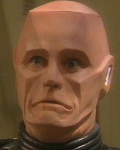

 What, uh.. What's that from?
What, uh.. What's that from?

